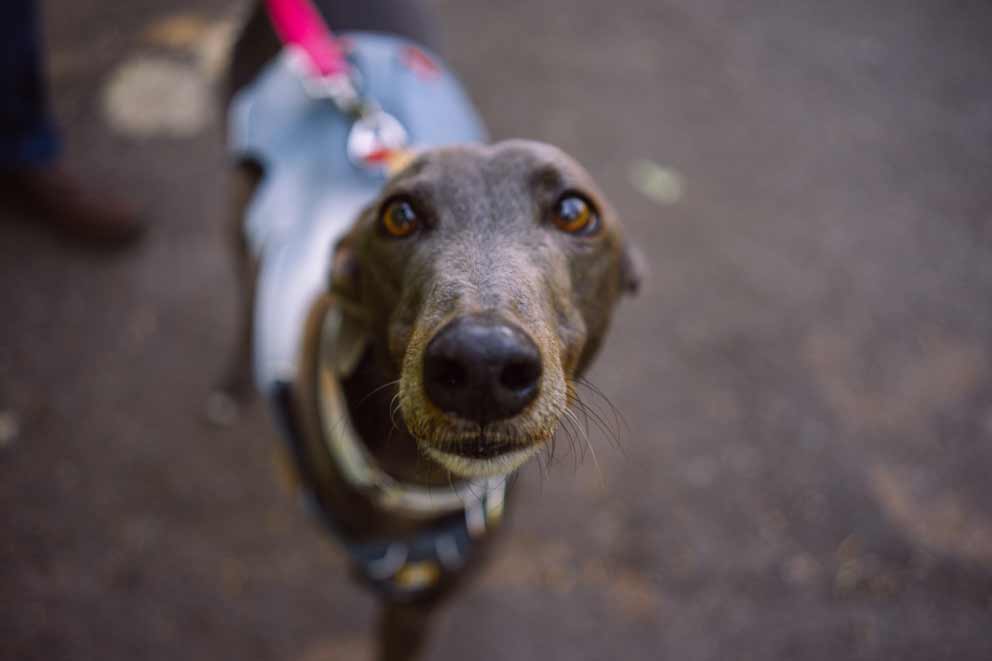End cruel greyhound racing in the UK
The popularity of greyhound racing has steadily declined in Great Britain; a positive reflection of a modern society that doesn’t tolerate suffering in the name of fun. Yet sadly, greyhound racing is still legal and leads to hundreds of dog deaths and thousands of painful injuries each year. Join us in calling for a full ban — it’s time to #CutTheChase.

The race is almost over in Wales, tell the Welsh Government you support the ban
Thanks to you, we’ve almost reached the finish line in Wales. On February 18, the Welsh Government announced that it would pursue a ban on greyhound racing in Wales.
It’s not over yet, and we can’t put this ban on greyhound racing in danger. With your help, we can encourage them to stop this cruel 'sport' for good and set an example for the other six countries where commercial greyhound racing still takes place (including England, Scotland and Ireland).
Contact your Members of the Senedd to tell them that greyhound racing has no place in modern Wales.
Animals' lives are not to be gambled
Every year, thousands of greyhounds face a life of uncertainty, injury and even death in the name of sport, fun and profit (through greyhound bets).
Enough is enough, and an end to greyhound racing - where dogs chase a mechanical hare around a track - is long overdue.
We think this is possible with a phase-out program. We have teamed up with Blue Cross, Dogs Trust, Greyhound Rescue Wales, and Hope Rescue. Together, we aim to protect future generations of dogs from the dangers of these races and race tracks.
Unlike England, Wales has no greyhound-specific regulations and its one remaining track only became licensed in 2023. The industry considers this is enough to protect the welfare of greyhounds raced in Wales. We wholeheartedly disagree.
The sad facts are that many dogs aren't properly socialised, trained or provided healthcare and there's little formal education for non-veterinary trained people working within the independent racing sector.
Tell your Members of the Senedd that greyhound racing has no place in modern Wales by contacting them using our tool now.
Greyhound racing comes at far too high a price for the dogs used, both during and after their racing careers - if they make it that far.
2,700 greyhounds died and over 26,500 injuries to greyhounds were recorded between 2018 and 2023
Data from The Greyhound Board of Great Britain.
Greyhound racing is cruel
Greyhound racing is a dangerous industry that causes thousands of injuries every year. Dogs suffer broken legs, head trauma, and even fatal injuries on UK racetracks.
While dog racing is still legal in the UK, most countries have banned it due to serious animal welfare concerns. New Zealand recently announced a phase-out thanks to the efforts of local animal welfare charities. They joined Italy, Argentina, and most of the USA in ending this cruel practice.
Only nine countries allow commercial greyhound racing, including the UK nations—England, Scotland, Wales, and Northern Ireland—as well as Australia, Mexico, Ireland, the United States, and Vietnam.
Wales is moving to ban greyhound racing. It’s time for the rest of the UK to follow suit and protect these dogs from further suffering.
Greyhound racing statistics
- Between 2018 and 2021, Hope Rescue's ‘Amazing Greys’ project helped over 200 racing greyhounds in Wales. Of these dogs, 40 suffered serious injuries that ended their careers. These injuries included severe fractures. They needed major vet care, amputation, or orthopaedic repair.*
- Data from the Greyhound Board of Great Britain shows that over 2,700 greyhounds died and over 26,500 injuries were recorded from greyhound racing between 2018 and 2023. Data from the same source also showed that:
- By the age of 3.5 years old, 50% of greyhounds are no longer racing.
- By five years old, 90% of greyhounds are no longer racing.
- Around 6,000 greyhounds leave the licensed industry each year, with many needing to find new homes. This leaves charities and rescue organisations to pick up the pieces
* Some of these dogs may have finished their racing lives outside of Wales, but were surrendered to the project due to their racing owners having links with the Welsh track. The true number of injuries in Wales is difficult to know, as there is no requirement to publish the number of injuries or deaths at an individual track level.

Report a concern
Concerned that a dog in your local area is suffering cruelty or neglect? Use our report a concern tool to be guided to the best and quickest way of getting them the help they need.



